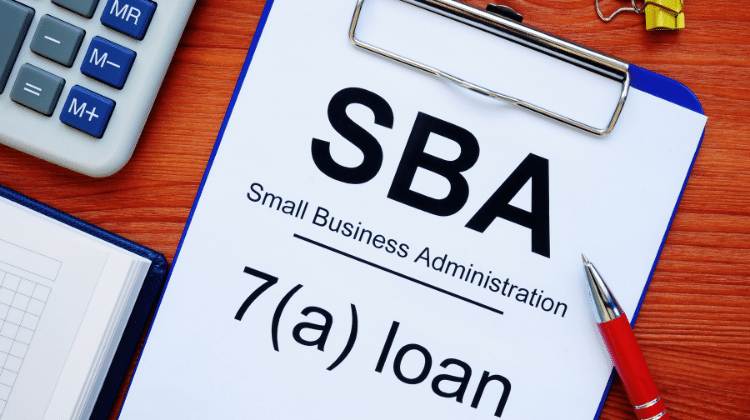
The U.S. Small Business Administration (SBA)’s 7(a) loan program is the most popular source of small business financing backed by a federal guaranty. Loans can be approved for amounts up to $5 million, with maturity rates from 10 to 25 years, and average APR rates of 6.30%-10%.
Since SBA 7(a) loans have strict requirements, a majority of small business owners do not get approved. Here are some common reasons why you can be denied.
Missing Documentation
Mission documentation is one of the main reasons why small business owners get denied for a loan. When deciding to apply for an SBA 7(a) program, you must be able to provide appropriate documents to your lender, so they can submit a complete package to the SBA for approval. Some of these documents may include:
- The SBA Loan Application – SBA Form 1919
- SBA Personal Background and Financial Statement Forms
- Profit and loss (P&L) statement and balance sheet for the last three years
- Projected financial statements
- Proof of ownership
- Personal and business federal income tax returns for the last three years
Any missing information may result in either the lender canceling your application or declining your loan altogether.
Low Personal and Business Credit Score
Usually, a personal credit score (FICO) of 640 or higher is required for an SBA 7(a) loan. However, this can vary depending on the lender. The higher your FICO score, the greater the chances are of getting approved. Similarly, a high business credit score (SBSS) will show the lender that your business has been paying its creditors on time.
For an SBA 7(a) loan, your SBSS score should be 140 or higher. A lower credit score is considered a risk factor, in that your business may not be able to repay the loan on time. Some additional factors that may impact your business’s creditworthiness include:
- A history of recent bankruptcies
- Tax liens
- Judgments
- Foreclosures
Poor Financial Ratios
When you apply for an SBA 7(a) loan, an underwriter will conduct a ratio analysis to evaluate whether your business can afford to pay the amount of money being borrowed. As a part of their analysis, both your personal and business financial ratios will be reviewed. The three key ratios that are commonly used include:
- Debt Service Coverage Ratio (DSCR): This ratio is calculated by taking your business’s total earnings before interest, taxes, depreciation, and amortization (EBITDA), then dividing it by your total amount of business loan debt. While the DSCR ratio threshold can vary by lender, the SBA considers ratios below 1.15 a sign that your business has too much debt.
- Debt-to-Income (DTI) Ratio: This ratio is calculated by taking your total monthly expenses, including outstanding debt from loans, then dividing it by your total monthly gross income. A high DTI ratio is considered a risk factor to a creditor. Meaning that you may not have enough income to cover all of your debt, including another loan.
- Debt to Tangible Net Worth Ratio: The debt to tangible net worth ratio calculates your business’s total liabilities, then divides by its tangible net worth. Tangible net worth includes your total assets, minus total liabilities, and excludes intangible assets, such as patents, trademarks, and goodwill. A high debt-to-tangible net worth ratio is considered another risk factor and a sign that your business does not have enough physical assets to protect a creditor in the event of insolvency (e.g., bankruptcy).
Insufficient Cash Flow
Cash is king and the lifeblood of a business. To qualify for an SBA 7(a) loan, your business must be able to show that it has sufficient cash flow or the ability to convert liquid assets into cash.
A lender will examine whether you can pay your suppliers on time, quickly turn inventory into cash, and collect accounts receivables on time. If your business has insufficient cash flow, it can cause your 7(a) loan application to be denied.
Ineligible Business Types
While most small businesses are eligible for an SBA 7(a) loan program, some are not. To qualify, your business would need to meet certain criteria such as:
- Be legally operating as a for-profit business
- Have fewer than 500 employees and less than $7.5 million in annual revenue over the past three years
- Have net income under $5 million (after taxes) and a tangible net worth less than $15 million
- Show that you have “invested equity” (e.g., your own time and money was invested into the business)
- Be physically based in the U.S. and doing business with the U.S. or its territories
- Be of “good character” (e.g., no criminal record)
- Cannot be delinquent on any U.S. government loans or taxes
- Be operating in the eligible business industry. Non-profit businesses and other industries like gambling, investment, or lending may not qualify.
The Bottom Line
The SBA 7(a) loan program is a popular source of financing for small business owners. However, the credit requirements may make it difficult for many small businesses to qualify. To increase your chances of getting approved, it is important to understand the SBA’s terms, conditions, and eligibility criteria.
If you disagree with your lender’s decision, it is best to contact the lender directly to find out why your application was denied. You should also visit the SBA website, and utilize their 7(a) loan checklist to ensure that all of the required documents have been submitted. If your business was denied for an SBA 7(a) loan, you can always reapply after 90 days.
Sources:
U.S. Small Business Administration (2020). 7(a) Loan Application Checklist. Retrieved October 19, 2020, from https://www.sba.gov/loans-grants/see-what-sba-offers/sba-loan-programs/general-small-business-loans-7a/7a-loan-application-checklist
U.S. Small Business Administration (2020). 7(a) Loan Program Eligibility. Retrieved October 19, 2020, from https://www.sba.gov/loans-grants/see-what-sba-offers/sba-loan-programs/general-small-business-loans-7a/7a-loan-program-eligibility


